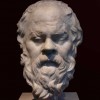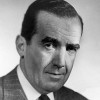Where this will end? In the Abyss, one may prophecy; whither all Delusions are, at all moments, traveling; where this Delusion has now arrived. For if there be a Faith, from of old, it is this, as we often repeat, that no Lie can live for ever. The very Truth has to change its vesture, from time to time; and be born again. But all Lies have sentence of death written down against them, and Heaven’s Chancery itself; and, slowly or fast, advance incessantly towards their hour.
Thomas Carlyle (1795-1881) Scottish essayist and historian
The French Revolution: A History, Part 1, Book 6, ch. 3 (1.6.3) (1837)
(Source)
Carlyle is speaking of the delusion that the wealthy and land-owners of pre-Revolutionary France could forever oppress their tenants with taxes and rent without finally driving them to bloody revolution.
A core phrase here was latched onto by Martin Luther King, Jr., who incorporated it as standard fare in his speeches in the mid- and late 1960s.
We shall overcome, because Carlyle is right, "No lie can live forever."
[Examples: 1, 2, 3, 4]
Quotations about:
lies
Note not all quotations have been tagged, so Search may find additional quotes on this topic.
Oh child, words well spoken might be false,
and with the beauty of words, might conquer truth;
yet this is not the surest test, that is character
and right; he who conquers with his fluency,
he is clever, but I hold facts mightier than words, always.[ὦ παῖ, γένοιντ᾽ἂν εὖ λελεγµένοι λόγοι
ψευδεῖς, ἐπῶν δὲ κάλλεσιν νικῷεν ἂν
τἀληθές· ἀλλ᾽οὐ τοῦτο τἀκριβέστατον,
ἀλλ᾽ἡ φύσις καὶ τοὐρθόν· ὃς δ᾽εὐγλωσσίᾳ
νικᾷ, σοφὸς µέν, ἀλλ᾽ἐγὼ τὰ πράγµατα
κρείσσω νοµίζω τῶν λόγων ἀεί ποτε.]Euripides (485?-406? BC) Greek tragic dramatist
Antiope [Αντιοπη], frag. 206 (Kannicht) [Antiope/ΑΝΤΙΟΠΗ?] (c. 410 BC) [tr. Will (2015)]
(Source)
(Source (Greek)). TGF frag. 205.
Rumor, quicksilver afoot
and swift on the wing, a monster, horrific, huge
and under every feather on her body — what a marvel —
an eye that never sleeps and as many tongues as eyes
and as many raucous mouths and ears pricked up for news.
By night she flies aloft, between the earth and sky,
whirring across the dark, never closing her lids
in soothing sleep. By day she keeps her watch,
crouched on a peaked roof or palace turret,
terrorizing the great cities, clinging as fast
to her twisted lies as she clings to words of truth.[… [P]edibus celerem et pernicibus alis,
monstrum horrendum, ingens, cui, quot sunt corpore plumae
tot vigiles oculi subter, mirabile dictu,
tot linguae, totidem ora sonant, tot subrigit aures.
Nocte volat caeli medio terraeque per umbram,
stridens, nec dulci declinat lumina somno;
luce sedet custos aut summi culmine tecti,
turribus aut altis, et magnas territat urbes;
tam ficti pravique tenax, quam nuntia veri.]Virgil (70-19 BC) Roman poet [b. Publius Vergilius Maro; also Vergil]
The Aeneid [Ænē̆is], Book 4, l. 180ff (4.180-188) (29-19 BC) [tr. Fagles (2006), l. 226ff]
(Source)
The personification of "Rumor" (Fame, or Fama).
(Source (Latin)). Alternate translations:
Swift footed, quick she flyes,
A huge fowle Monster, in each feather lies
A watching eye conceal'd, (and strange) she bears
As many tongues, loud mouths, and list'ning ears.
A watch by day, on battlements she lights,
Or lofty towers, and mighty towns affrights.
Falshoods, and lyes, of as the truth she tells,
And Nations then with various rumours swells.
Things feign'd and reall, glad alike she sung.
[tr. Ogilby (1649)]
Swift is her walk, more swift her winged haste:
A monstrous phantom, horrible and vast.
As many plumes as raise her lofty flight,
So many piercing eyes enlarge her sight;
Millions of opening mouths to Fame belong,
And ev'ry mouth is furnish'd with a tongue,
And round with list'ning ears the flying plague is hung.
She fills the peaceful universe with cries;
No slumbers ever close her wakeful eyes;
By day, from lofty tow'rs her head she shews,
And spreads thro' trembling crowds disastrous news;
With court informers haunts, and royal spies;
Things done relates, not done she feigns, and mingles truth with lies.
Talk is her business, and her chief delight
To tell of prodigies and cause affright.
[tr. Dryden (1697)]
Swift to move with feet and persevering wings: a monster hideous, immense; who (wondrous to relate!) for as many plumes as are in her body, numbers so many wakeful eyes beneath, so many tongues, so many babblingmouths, pricks up so many listening ears. By night, through the mid regions of the sky, and through the shades of earth, she flies buzzing, nor inclines her eyes to balmy rest. Watchful by day, she perches either on some high house-top, or on lofty turrets, and fills mighty cities with dismay; as obstinately bent on falsehood and iniquity as on reporting truth.
[tr. Davidson/Buckley (1854)]
... With feet and rapid wings for flight.
Huge, terrible, gigantic Fame!
For every plume that clothes her frame
An eye beneath the feather peeps,
A tongue rings loud, an ear upleaps.
Hurtling 'twixt earth and heaven she flies
By night, nor bows to sleep her eyes:
Perched on a roof or tower by day
She fills great cities with dismay;
How oft soe'er the truth she tell,
She loves a falsehood all too well.
[tr. Conington (1866)]
With nimble feet, and swift persistent wings,
A monster huge and terrible is she.
As many feathers as her body bears,
So many watchful eyes beneath them lurk,
So many tongues and mouths, and ears erect.
By night 'twixt heaven and earth she flies, through shades,
With rushing wings, nor shuts her eyes in sleep.
By day she watches from the roofs or towers;
And the great cities fills with haunting fears;
As prone to crime and falsehood as to truth ...
[tr. Cranch (1872), l. 236ff]
Fleet-footed and swift of wing, ominous, awful, vast; for every feather on her body is a waking eye beneath, wonderful to tell, and a tongue, and as many loud lips and straining ears. By night she flits between sky and land, shrilling through the dusk, and droops not her lids in sweet slumber; in daylight she sits on guard upon tall towers or the ridge of the house-roof, and makes great cities afraid; obstinate in perverseness and forgery no less than messenger of truth.
[tr. Mackail (1885)]
Swift are her wings to cleave the air, swift-foot she treads the earth:
A monster dread and huge, on whom so many as there lie
The feathers, under each there lurks, O strange! a watchful eye;
And there wag tongues, and babble mouths, and hearkening ears upstand
As many: all a-dusk by night she flies 'twixt sky and land
Loud clattering, never shutting eye in rest of slumber sweet.
By day she keepeth watch high-set on houses of the street,
Or on the towers aloft she sits for mighty cities' fear!
And lies and ill she loves no less than sooth which she must bear.
[tr. Morris (1900)]
Swift-winged, swift-footed, of enormous girth,
Huge, horrible, deformed, a giantess from birth.
As many feathers as her form surround,
Strange sight! peep forth so many watchful eyes,
So many mouths and tattling tongues resound,
So many ears among the plumes uprise.
By night with shrieks 'twixt heaven and earth she flies,
Nor suffers sleep her eyelids to subdue;
By day, the terror of great towns, she spies
From towers and housetops, perched aloft in view,
Fond of the false and foul, yet herald of the true.
[tr. Taylor (1907), st. 23-24, l. 206ff]
Feet swift to run and pinions like the wind
the dreadful monster wears; her carcase huge
is feathered, and at root of every plume
a peering eye abides; and, strange to tell,
an equal number of vociferous tongues,
foul, whispering lips, and ears, that catch at all.
At night she spreads midway 'twixt earth and heaven
her pinions in the darkness, hissing loud,
nor e'er to happy slumber gives her eyes:
but with the morn she takes her watchful throne
high on the housetops or on lofty towers,
to terrify the nations. She can cling
to vile invention and malignant wrong,
or mingle with her word some tidings true.
[tr. Williams (1910)]
Swift of foot and fleet of wing, a monster awful and huge, who for the many feathers in her body has as many watchful eyes below -- wondrous to tell -- as many tongues, as many sounding mouths, as many pricked-up ears. By night, midway between heaven and earth, she flies through the gloom, screeching, nor droops her eyes in sweet sleep; by day she sits on guard on high roof-top or lofty turrets, and affrights great cities, clinging to the false and wrong, yet heralding truth.
[tr. Fairclough (1916)]
Swift of foot,
Deadly of wing, a huge and terrible monster,
With an eye below each feather in her body,
A tongue, a mouth, for every eye, and ears
Double that number; in the night she flies
Above the earth, below the sky, in shadow
Noisy and shrill; her eyes are never closed
In slumber; and by day she perches, watching
From tower or battlement, frightening great cities.
She heralds truth, and clings to lies and falsehood,
[tr. Humphries (1951)]
A swift-footed creature, a winged angel of ruin,
A terrible, grotesque monster, each feather upon whose body --
Incredible though it sounds -- has a sleepless eye beneath it,
And for every eye she has also a tongue, a voice and a pricked ear.
At night she flits midway between earth and sky, through the gloom
Screeching, and never closes her eyelids in sweet slumber:
By day she is perched like a look-out either upon a roof-top
Or some high turret; so she terrorises whole cities,
Loud-speaker of truth, hoarder of mischievous falsehood, equally.
[tr. Day Lewis (1952)]
Fast-footed
and lithe of wing, she is a terrifying
enormous monster with as many feathers
as she has sleepless eyes beneath each feather
(amazingly), as many sounding tongues
and mouths, and raises up as many ears.
Between the earth and skies she flies by night,
screeching across the darkness, and she never
closes her eyes in gentle sleep. By day
She sits as sentinel on some steep roof
or on high towers, frightening vast cities;
for she holds fast to falsehood and distortion
as often as to messages of truth.
[tr. Mandelbaum (1971), l. 237ff]
... [G]iving her speed on foot and on the wing:
Monstrous, deformed, titanic. Pinioned, with
An eye beneath for every body feather,
And, strange to say, as many tongues and buzzing
Mouths as eyes, as many pricked-up ears,
By night she flies between the earth and heaven
Shrieking through darkness, and she never turns
Her eye-lids down to sleep. by day she broods,
On the alert, on rooftops or on towers,
Bringing great cities fear, harping on lies
And slander evenhandedly with truth.
[tr. Fitzgerald (1981), l. 248ff]
Rumour is quick of foot and swift on the wing, a huge and terrible monster, and under every feather of her body, strange to tell, there lies an eye that never sleeps, a mouth and a tongue that are never silent, and an ear always pricked. by night she flies between earth and sky, squawking through the darkness, and never lowers her eyelids in sweet sleep. By day she keeps watch perched on the tops of gables or on high towers and causes fear in great cities, holding fast to her lies and distortions as often as she tells the truth.
[tr. West (1990)]
A monster, vast and terrible, fleet-winged
and swift-footed, sister to Coeus and Enceladus,
who for every feather on her body has as many
watchful eyes below (marvelous to tell), as many
tongues speaking, as many listening ears.
She flies, screeching, by night through the shadows
between earth and sky, never closing her eyelids
in sweet sleep: by day she sits on guard on tall roof-tops
or high towers, and scares great cities, as tenacious
of lies and evil, as she is messenger of truth.
[tr. Kline (2002)]
Fast on her feet, her beating wings a blur,
She is a dread, looming monster. Under every feather
On her body she has -- strange to say -- a watchful eye,
A tongue, a shouting mouth, and pricked-up ears.
By night she wheels through the dark skies, screeching,
And never closes her shining eyes in sleep.
By day she perches on rooftops or towers,
Watching, and she throws whole cities into panic,
As much a hardened liar as a herald of truth.
[tr. Lombardo (2005), l. 205ff]
Her feet are swift and her wings are hateful,
A dread creation whose huge body bristles with feathers.
And beneath them all are watchful eyes, chilling to describe
And as many tongues within whispering mouths and between attentive ears.
At night she flights mid-sky and over the shadowed earth,
Hissing, refusing to rest her eyes in sweet sleep.
At day she stands guard at the highest roof-peak
Or on looming towers as she brings the cities terror.
She sticks at times to base lies and other times to truth.
[tr. @sentantiq (2015)]
She's fast of foot and fleet of wing, a huge horrific monster.
Under all her feathers lurk (amazingly)
as many watching eyes and tongues,
as many talking mouths and pricked-up ears.
She flies by night, between the sky and earth, screeching through the dark.
Her eyes don't close in welcome sleep.
By day she perches as a lookout on high roofs
or towers and alarms great cities.
She's as fond of fiction and perversity as truth.
[tr. Bartsch (2021)]
Only Truth can give true reputation: only reality can be of real profit. One deceit needs many others and so the whole house is built in the air and must soon come to the ground.
[Sola la verdad puede dar reputación verdadera, y la substancia entra en provecho. Un embeleco ha menester otros muchos, y así toda la fábrica es quimera, y como se funda en el aire es preciso venir a tierra.]Baltasar Gracián y Morales (1601-1658) Spanish Jesuit priest, writer, philosopher
The Art of Worldly Wisdom [Oráculo Manual y Arte de Prudencia], § 175 (1647) [tr. Jacobs (1892)]
(Source)
(Source (Spanish)). Alternate translations:
Nothing but truth can give a true Reputation; and nothing but substance turns to account. One cheat stands in need of a great many others, and by consequent, the whole building is but imaginary: and seeing it is founded in the air, it must of necessity fall to the ground.
[Flesher ed. (1685)]
Only truth can bestow a true reputation, and only solid character prove profitable; one fraud makes necessary another and more; and so the whole of what is built up is flimsy, and as it rests upon air, it is destined to return to earth.
[tr. Fischer (1937)]
Only the truth can give you a true reputation, and only substance is profitable. One act of deceit begets many others, and soon the whole ghastly construction, which is founded in the air, comes tumbling down.
[tr. Maurer (1992)]
If political loyalty is signaled by believing a true story, anyone can fake it. But believing ridiculous and outlandish stories exacts greater cost, and is therefore a better signal of loyalty. If you believe your leader only when he or she tells the truth, what does that prove? In contrast, if you believe your leader even when he or she builds castles in the air, that’s loyalty! Shrewd leaders might sometimes deliberately say nonsensical things as a way to distinguish reliable devotees from fair-weather supporters.
Yuval Noah Harari (b. 1976) Israeli public intellectual, historian, academic, writer [יובל נח הררי]
“Why Fiction Trumps Truth,” New York Times (24 May 2019)
(Source)
If everybody always lies to you, the consequence is not that you believe the lies, but rather that nobody believes anything any longer. This is because lies, by their very nature, have to be changed, and a lying government has constantly to rewrite its own history. On the receiving end you get not only one lie — a lie which you could go on for the rest of your days — but you get a great number of lies, depending on how the political wind blows. And a people that no longer can believe anything cannot make up its mind. It is deprived not only of its capacity to act but also of its capacity to think and to judge. And with such a people you can then do what you please.
Hannah Arendt (1906-1975) German-American philosopher, political theorist
Interview with Roger Errera (Oct 1973), The New York Review of Books (26 Oct 1978)
(Source)
In this decline of all public virtue, ambition, and not avarice, was the passion that first possessed the minds of men; and this was natural. Ambition is a vice that borders on the confines of virtue; it implies a love of glory, of power, and pre-eminence; and these are objects that glitter alike in the eyes of the man of honour, and the most unprincipled: but the former pursues them by fair and honourable means, while the latter, who finds within himself no resources of talent, depends altogether upon intrigue and fallacy for his success.
[Sed primo magis ambitio quam avaritia animos hominum exercebat, quod tamen vitium propius virtutem erat. Nam gloriam, honorem, imperium bonus et ignavus aeque sibi exoptant; sed ille vera via nititur, huic quia bonae artes desunt, dolis atque fallaciis contendit.]
Sallust (c. 86-35 BC) Roman historian and politician [Gaius Sallustius Crispus]
Bellum Catilinae [The War of Cateline], ch. 11, sent. 1-2 [tr. Murphy (1807)]
(Source)
Also known as Catilinae Coniuratio [The Conspiracy of Cateline]. (Source (Latin)). Alternate translations:
At first, indeed, the minds of men were less influenced by avarice than ambition, a vice which has some affinity to virtue; for the desire of glory, power, and preferment is common to the worthy and the worthless; with this difference, that the one pursues them by direct means; the other, being void of merit, has recourse to fraud and subtlety.
[tr. Rose (1831)]
But at first ambition more than avarice influenced the minds of the Romans. Which vice however was the nearer to virtue. For glory, honour, command, the good and slothful equally wish for themselves. But the former strives by the right course; to the latter because good qualities are wanting, he works by tricks and deceits.
[Source (1841)]
At first, however, it was ambition, rather than avarice, that influenced the minds of men; a vice which approaches nearer to virtue than the other. For of glory, honor, and power, the worthy is as desirous as the worthless; but the one pursues them by just methods; the other, being destitute of honorable qualities, works with fraud and deceit.
[tr. Watson (1867)]
At first it was not so much avarice as ambition which spurred men's minds, a vice, indeed, but one akin to virtue. Glory, distinction, and power in the state are equally desired by good and bad, though the first strives to reach his goal by the path of honor, the second, in the lack of honest arts, uses the weapons of falsehood and deceit.
[tr. Pollard (1882)]
But at first men’s souls were actuated less by avarice than by ambitions -- a fault, it is true, but not so far removed from virtue; for the noble and the base alike long for glory, honour, and power, but the former mount by the true path, whereas the latter, being destitute of noble qualities, rely upon craft and deception.
[tr. Rolfe (1931)]
At first people's minds were taxed less by avarice than by ambition, which, though a fault, was nevertheless closer to prowess: for the good man and the base man have a similar personal craving for glory, honour, and command, but the former strives along the truth path, whereas the latter, because he lacks good qualities, presses forward by cunning and falsity.
[tr. Woodman (2007)]
Indeed rhetoricians are permitted to lie about historical matters so they can speak more subtly.
[Quidem concessum est rhetoribus ementiri in historiis ut aliquid dicere possint argutius.]
Marcus Tullius Cicero (106-43 BC) Roman orator, statesman, philosopher
Brutus, sec. 42 (46 BC)
Alt. trans.:
- "Orators are indeed permitted to lie about historical matters so they can speak more subtly."
- "For it is the privilege of rhetoricians to exceed the truth of history, that they may have an opportunity of embellishing the fate of their heroes." [tr. Jones (1776)]
- "Fabrication's certainly allowed when practitioners of rhetoric write history, to frame a point more cleverly." [tr. Kaster (2020)]
“They’re brothers,” said Zach, and you had to admire him, if only for his persistence. But it didn’t matter, because in an interview a lie can almost be as good as the truth. That’s because all good lies contain as much truth as the liar thinks they can get away with. This truth accumulates, and because it’s easier to remember the truth than something you’ve made up, it remains consistent where the lies do not. All you have to do is keep asking variations on the same questions, until you can sort one from the other. That’s why helping the police with their inquiries can take you all day — if you’re lucky.
There are three kinds of lies: lies, damned lies, and statistics.
Benjamin Disraeli (1804-1881) English politician and author
(Attributed)
(Source)
Attributed by Mark Twain in "Chapters from My Autobiography" (Apr 1904), North American Review (7 Sep 1906): "Figures often beguile me, particularly when I have the arranging of them myself; in which case the remark attributed to Disraeli would often apply with justice and force: 'There are three kinds of lies: lies, damned lies, and statistics.'"
The phrase has not been found in any of Disraeli's works, and he is considered unlikely to be the originator. Variants of the phrase date back a century or more from Twain's reference. More discussion about this quotation here:
The more lies are told, the more important it becomes for the liars to justify themselves by deep moral commitments to high-sounding objectives that mask the pursuit of money and power.
We begin by fooling others and end up fooling ourselves.
Eric Alterman (b. 1960) American historian, journalist, author
Sound and Fury: The Washington Punditocracy and the Collapse of American Politics, Introduction (1992)
When the issue is one of Truth and Justice, there can be no differentiating between small problems and great ones. For the general viewpoints on human behaviour are indivisible. People who fail to regard the truth seriously in small matters, cannot be trusted in matters that are great.
[Wenn es sich um Wahrheit und Gerechtigkeit handelt, gibt es nicht die Unterscheidung zwischen kleinen und grossen Problemen. Denn die allgemeinen Gesichtspunkte, die das Handeln der Menschen betreffen, sind unteilbar. Wer es in kleinen Dingen mit der Wahrheit nicht ernst nimmt, dem kann man auch in grossen Dingen nicht vertrauen …]
The speed of communications is wondrous to behold. It is also true that speed can multiply the distribution of information that we know to be untrue. The most sophisticated satellite has no conscience. The newest computer can merely compound, at speed, the oldest problem in the relations between human beings and in the end the communicator will be confronted with the old problem of what to say and how to say it.
Edward R. Murrow (1908-1965) American journalist
Speech, The Family of Man Award, The Protestant Council of New York (Oct 1964)
(Source)
His last public speech. Reprinted in Alexander Kendrick, Prime Time: The Life of Edward R. Murrow (1969).
The cruelest lies are often told in silence. A man may have sat in a room for hours and not opened his teeth, and yet come out of that room a disloyal friend or a vile calumniator.
Robert Louis Stevenson (1850-1894) Scottish essayist, novelist, poet
Virginibus Puerisque, “Virginibus Puerisque,” sec. 4 (1881)
(Source)























